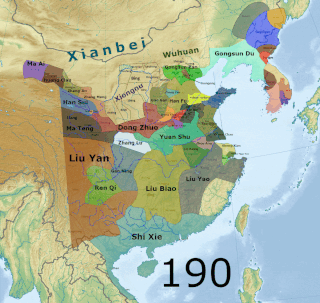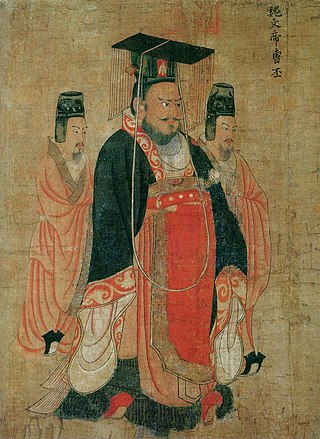The 180s decade ran from January 1, 180, to December 31, 189.
The 220s decade ran from January 1, 220, to December 31, 229.

The Three Kingdoms of Cao Wei, Shu Han, and Eastern Wu dominated China from 220 to 280 AD following the end of the Han dynasty. This period was preceded by the Eastern Han dynasty and followed by the Western Jin dynasty. Academically, the periodisation begins with the establishment of Cao Wei in 220 and ends with the conquest of Wu by Jin in 280. The period immediately preceding the Three Kingdoms from 184 to 220 was marked by chaotic infighting among warlords across China as Han authority collapsed. The period from 220 to 263 was marked by a comparatively stable arrangement between Cao Wei, Shu Han, and Eastern Wu. This stability broke down with the conquest of Shu by Wei in 263, followed by the usurpation of Cao Wei by Jin in 266, and ultimately the conquest of Wu by Jin in 280.

Year 220 (CCXX) was a leap year starting on Saturday of the Julian calendar. At the time, it was known as the Year of the Consulship of Antonius and Eutychianus. The denomination 220 for this year has been used since the early medieval period, when the Anno Domini calendar era became the prevalent method in Europe for naming years.

Year 229 (CCXXIX) was a common year starting on Thursday of the Julian calendar. At the time, it was known as the Year of the Consulship of Severus and Cassius. The denomination 229 for this year has been used since the early medieval period, when the Anno Domini calendar era became the prevalent method in Europe for naming years.

Romance of the Three Kingdoms is a 14th-century historical novel attributed to Luo Guanzhong. It is set in the turbulent years towards the end of the Han dynasty and the Three Kingdoms period in Chinese history, starting in 184 AD and ending with the reunification of the land in 280 by the Western Jin. The novel is based primarily on the Records of the Three Kingdoms, written by Chen Shou in the 3rd century.

Wei (220–266), known as Cao Wei (曹魏) or Former Wei in historiography, was a dynastic state of China and one of the three major states that competed for supremacy over China in the Three Kingdoms period. With its capital initially located at Xuchang, and thereafter Luoyang, the state was established by Cao Pi in 220, based upon the foundations laid by his father, Cao Cao, towards the end of the Eastern Han dynasty.

Han (漢; 221–263), known in historiography as Shu Han (蜀漢 ) or Ji Han (季漢 "Junior Han"), or often shortened to Shu (Chinese: 蜀; pinyin: Shǔ; Sichuanese Pinyin: Su2 < Middle Chinese: *źjowk < Eastern Han Chinese: *dźok), was a dynastic state of China and one of the three major states that competed for supremacy over China in the Three Kingdoms period. The state was based in the area around present-day Hanzhong, Sichuan, Chongqing, Yunnan, Guizhou, and north Guangxi, an area historically referred to as "Shu" based on the name of the past ancient kingdom of Shu, which also occupied this approximate geographical area. Its core territory also coincided with Liu Bang's Kingdom of Han, the precursor of the Han dynasty.
Cao Rui, courtesy name Yuanzhong, was the second emperor of the state of Cao Wei during the Three Kingdoms period. His parentage is in dispute: his mother, Lady Zhen, was Yuan Xi's wife, but she later remarried Cao Pi, the first ruler of Wei. Based on conflicting accounts of his age, Pei Songzhi calculated that, in order to be Cao Pi's son, Cao Rui could not have been 36 when he died as recorded, so the recorded age was in error; late-Qing scholar Lu Bi and Mou Guangsheng argued instead that Cao Rui was Yuan Xi's son.

Colonies in antiquity were post-Iron Age city-states founded from a mother-city or metropolis rather than a territory-at-large. Bonds between a colony and its metropolis often remained close, and took specific forms during the period of classical antiquity. Generally, colonies founded by the ancient Phoenicians, Carthage, Rome, Alexander the Great and his successors remained tied to their metropolis, though Greek colonies of the Archaic and Classical eras were sovereign and self-governing from their inception. While Greek colonies were often founded to solve social unrest in the mother-city by expelling a part of the population, Hellenistic, Roman, Carthaginian, and Han Chinese colonies were used for trade, expansion and empire-building.
Hua Xin, courtesy name Ziyu, was a Chinese politician who lived during the late Eastern Han dynasty and Three Kingdoms period of China. He initially served directly under the central government of the Eastern Han dynasty. Later, he served under the warlord Sun Ce and then under the warlord Cao Cao. He continued to serve in the Cao Wei state during the Three Kingdoms period.
Sima Fu, courtesy name Shuda, was an imperial prince and statesman of the Jin dynasty of China. He previously served as an official in the state of Cao Wei during the Three Kingdoms period before his grandnephew, Sima Yan, usurped the Wei throne in 266 and established the Jin dynasty. Sima Guang, author of Zizhi Tongjian, claimed to be his descendant.
Kebineng was a Xianbei chieftain who lived during the late Eastern Han Dynasty and Three Kingdoms period of China. He rose to power during the late Eastern Han dynasty after the warlord Cao Cao defeated the Wuhuan tribes in northern China at the Battle of White Wolf Mountain in 207. He was ultimately assassinated by Cao Wei forces in 235.
Huan Jie, courtesy name Boxu, was a Chinese official who lived during the late Eastern Han dynasty and served under the warlord Cao Cao. After the fall of the Eastern Han dynasty, he briefly served in the state of Cao Wei during the Three Kingdoms period.
Fu Gu (209–255), courtesy name Lanshi, was an official of the state of Cao Wei during the Three Kingdoms period of China.
Bingzhou, or Bing Province, was a location in ancient China. According to legend, when Yu the Great tamed the flood, he divided the land of China into the Nine Provinces. Historical texts such as the Rites of Zhou, and "Treatise on Geography" section of the Book of Han, recorded that Bingzhou was one of the Nine Provinces. Bingzhou covered roughly the areas around present-day Baoding, Hebei, and Taiyuan and Datong in Shanxi.

He Yan, courtesy name Pingshu, was a Chinese philosopher and politician of the state of Cao Wei in the Three Kingdoms period of China. He was a grandson of He Jin, a general and regent of the Eastern Han dynasty. His father, He Xian, died early, so his mother, Lady Yin, remarried the warlord Cao Cao. He Yan thus grew up as Cao Cao's stepson. He gained a reputation for intelligence and scholarship at an early age, but he was unpopular and criticised for being arrogant and dissolute. He was rejected for government positions by both emperors Cao Pi and Cao Rui, but became a minister during the rule of Cao Shuang. When the Sima family took control of the government in a coup d'état in 249, he was executed along with all the other officials loyal to Cao Shuang.
Fu Xun was a politician of the state of Cao Wei during the Three Kingdoms period of China. He previously served under the warlord Liu Biao in the late Eastern Han dynasty.
Du Ji, courtesy name Bohou, was an official who lived in the late Eastern Han dynasty of China. He later served as a high-ranking official in the state of Cao Wei during the Three Kingdoms period. He had the reputation of being a model governor, valiant, loyal and wise. He was the grandfather of Du Yu, the author of the most influential Zuo Zhuan commentary, who gave the work its modern form.
Sun Shao, courtesy name Changxu, was a Chinese politician of the state of Eastern Wu during the Three Kingdoms period of China. He served as the first Imperial Chancellor of Eastern Wu from 222 to 225. He was not related to the imperial family of Eastern Wu even though he shared the same family name as them.